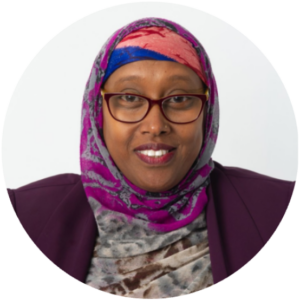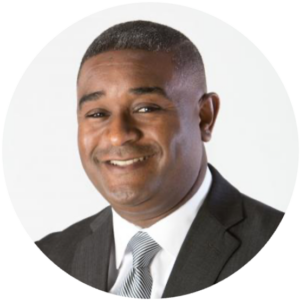
The USGLC is proud to have a diverse and innovative coalition of business, military, faith, and humanitarian leaders committed to building a safer and more prosperous world for all. This month, in celebration of Black History Month, we are shining a spotlight on two of our Advisory Committee members, the impactful work they are carrying out in their communities, and why leading globally matters locally.

Representative Deqa Dhalac currently serves as a member of the Maine House of Representatives for the 120th District. She is the former mayor of South Portland, Maine which cemented her as both the first Somali-American and the first African-born female mayor in the United States. She is a member of the USGLC Maine Advisory Committee.
How has your personal story had an impact on your work?
I would say motivation and determination play a great role in my work whether it’s advocacy, policy making, or community building. As immigrants, we often bring with us a strong sense of resilience which is based on lived experiences and overcoming challenges. I navigated different cultures and systems which allowed me to adapt and work harder to reach some of the goals that I set for myself.
What pushed you to go into politics?
I wanted to make a difference in my community. When I say my community, I do not mean the immigrant community only, but all the people that I have built relationships with throughout the years. I also think representation matters. As we all know Black immigrants are underrepresented and marginalized in the mainstream politics decision making process. Many people asked me to run for public office, especially due to my personal experiences and civic engagement. I also wanted to encourage and inspire our youth so they can say, “if she did it, I can do it.” Finally, going into politics was rooted in a desire for change in our political perspectives, especially at the local level.
Your organization Cross Cultural Community Services focuses on advocating for people of color, immigrant and refugee communities and combating white supremacy through education and advocacy – what motivated you to start this organization, and where have you seen the most impact?
I co-founded this organization with two of my dear friends, Regina Phillips who is a nine-generation African American Mainer and Abeir Ibrahim who is from Sudan. We worked together for the City of Portland Refugees Service Program for a long time. But when we lost one of our biggest grants, the city ended up closing the program which provided pivotal services to the immigrant community in the Greater Portland area. We realized after the program closed that so many organizations relied on our workshops about refugees and immigrants, so we decided to create our own organization to keep the work going.
What does it mean to you to be the first Somali-American mayor in US history? And the first African-born female mayor in the US?
It is both a great honor and incredibly humbling. I worked very hard to build community from when I first came to the USA, and I think that is really one of the reasons that I love what I do. I didn’t take the mayor position for granted because I returned all the calls and emails I got which made a lot of my constituents surprised when it was me calling them back.
What aspect of your work do you think is the most important to share?
I think communicating with my constituents is very important to me, without them I would not be able to be a city councilor, Mayor, or State Representative. I want to make sure I am their voice and if I disagree with their opinion, I tell them why I feel that way. But most of the time they know I am their voice, so I do my best to represent them.
What does “leading globally matters locally” mean to you?
I believe decisions made on a global scale can impact our local communities and I believe we have interconnections with the rest of the world. I often talk about the importance of global leadership and how that connects us when we are addressing local issues such as economic development, environmental sustainability, and social justice. I also believe that global level positive changes can have significant benefits in our local level communities. We saw that clearly in the COVID-19 pandemic when we all connected as one global community.
You can follow Rep. Dhalac on Instagram and Facebook.
Learn more about the USGLC in Maine and the Maine USGLC Advisory Committee.

Clarence Mingo is the current Vice President of Corporate Affairs/ESG and Government Relations for the T. Marzetti Company. He’s a former Franklin County Auditor, former Ohio Lottery Commissioner (appointed by former Ohio Governor John R. Kasich), and former Supreme Court of Ohio Commissioner (appointed by former Ohio Supreme Court Chief Justice Thomas Moyer). He is a member of the USGLC Ohio State Advisory Committee.
As Vice President of Corporate Affairs/ESG and Government Relations for T. Marzetti Company, where have you seen the biggest impact in the work you do?
A key area of impact is understanding how non-financial factors can impact business. Here’s a good example. If you are a food manufacturer, and you’re managing a supply chain, you are reliant on a wide range of ingredients to manufacture food. What’s happening in Europe and in South America could be very material to your ability to manufacture and get goods from your plant to the shelf for you to purchase. What we do in corporate affairs is to look at that universe and try to manage a range of external factors, so that the impact on the business is less.
But that also creates an opportunity to do good, because when you see those impacts, it puts you in a position to generate solutions. So, you can also look at an area like workforce development. It’s one thing for you to look within your footprint and say, “We need to train and enhance our workforce.” It’s another thing for you to look outside the walls of those footprints and think about other partners in the universe. Maybe it’s a university? Maybe it’s state or local government? And try to figure out a way to build relationships and partnerships that create shared value for your workforce, for those other partners, for the community and ultimately for the employee. We’re managing external factors for the good of the company, community, and stakeholder universe in general.
What have your experiences as Franklin County Auditor, Ohio Lottery Commissioner, and Supreme Court of Ohio Commissioner informed you about true leadership and how can we apply those lessons to our everyday lives?
I think public service is a noble calling. And now more than ever, we need individuals who are willing to sacrificially embrace public responsibility, and really view themselves as stewards of the public trust and the public good. The more we do that in a nonpartisan way and for the good of the people we serve, and less so for other factors and influences, I think the more valuable the service is. True leadership should be unafraid, unbiased, and chiefly for the good of others and not the self.
What aspect of your personal story has led to the most success in your life and career?
The most consequential decision I made in life was serving in the United States Army. Yeah, it really, really turned out to be a transformative experience. Number one, it instilled a concept of selflessness. The idea that work and aspirations, generally should be for the good of others and not for yourself. When you’re in the military, you’re always working to protect, cover and support the gentleman or gentlelady next to you. It’s less about you. Number two, was a focus on discipline. In those years in the military, you had you had a specific duty and it didn’t matter what it was. Whether you were a cook or in the infantry, it was noble, important, and highly consequential. Whatever I’m doing in life I should treat it as a high calling, whether I’m distributing newspapers or trying a case in a court. Those principles have really, really served me well.
What has been your main source of motivation over the years and in your career?
Early in my life, it probably was my parents. Whatever I did in life, I wanted to ensure that I was making them proud. And that my work, in how that was expressed in the workplace or in the public eye, was done so in a way that would never cause them shame and would reflect well on all that was poured into me. I still feel that way. But now I’m undertaking the work and learning and bending the universe around me in such a way that I want to make sure that I’m preparing my little corner of the world for my own kids and leaving my own little corner of the universe in a better place in which I found it. The idea being that I want to see my daughters have the same opportunities, if not more. To have the same experiences that I had , to be surrounded by the same kinds of people who loved and thought about me professionally, and personally, you know, I want to, by my own conduct, want to make sure that they’re encountering the same people, and that their behavior professionally induces people to respect, appreciate, and otherwise know that they’re there. To ensure that they are girls that will grow into women who do the right thing professionally, personally, spiritually, and otherwise. How I behave and what I do is relevant to the experiences my girls will have in terms of how they treat people, how they execute their work, and their motivations for doing so.
What does “leading globally matters locally” mean to you?
That phrase has always been and will always be relevant. But even more so now. Since the pandemic, the world has shrunk. We recognize now how what’s happening in another state, what’s happening on another continent, and what’s happening in another country impacts us locally. I’m here in Columbus, Ohio, and the war in the Middle East is incredibly consequential to issues being managed right here in Columbus, Ohio, at the local government level. We also do a lot of work in Kentucky. To hear Kentucky manufacturers talk about how the war in Ukraine is relevant to the manufacturing landscape in Kentucky, and in Ohio highlights the point that foreign policy is just not a matter for the State Department to be concerned about. It’s a matter for anyone who is transacting business and for anyone who’s a global citizen. It’s relevant to all of us. I’m not sure people always believe that. But I think we are learning it in real time just how interconnected we all are. And that these foreign policy issues are very much relevant to our lives on Main Street.
You can follow Clarence Mingo on Twitter and Facebook.
Learn more about the USGLC in Ohio and the Ohio USGLC Advisory Committee.